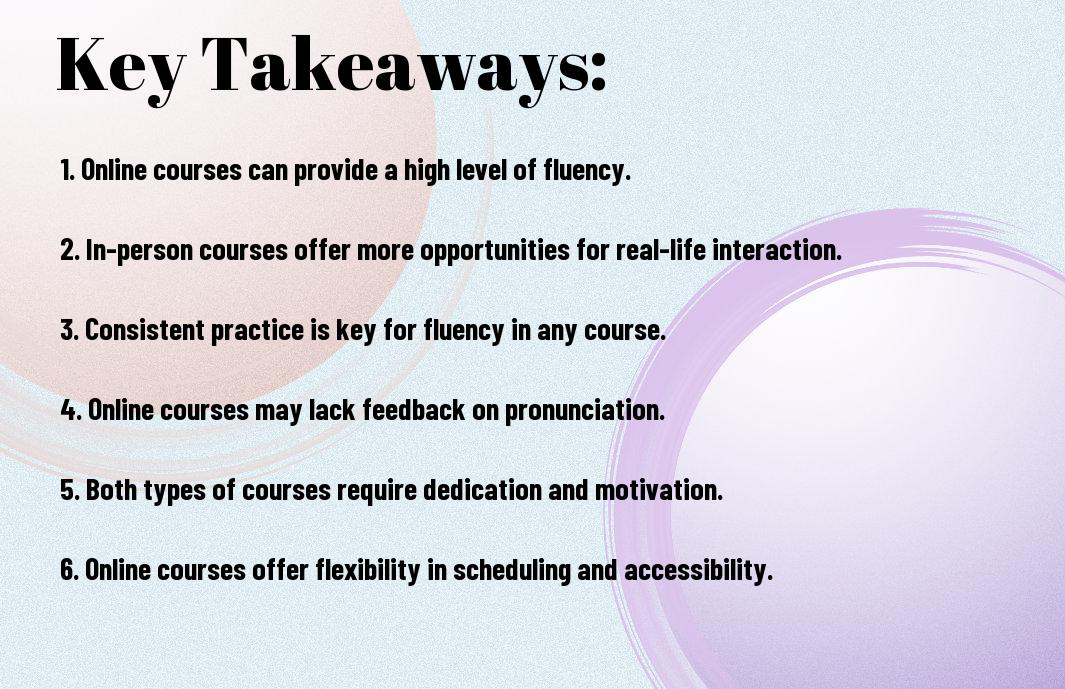Many language enthusiasts like yourself may wonder about the best platforms for online language learning courses. In this insightful guide, we will explore the most popular and effective online platforms where you can enhance your language skills from the comfort of your home. Whether you are looking to learn Spanish, French, Mandarin, or any other language, these platforms offer a variety of resources, interactive lessons, and opportunities for practice to help you achieve your language learning goals. Let’s dive in and discover the top choices for your linguistic journey!
Key Takeaways:
- Popular Platforms: Some of the most popular platforms for online language learning courses include Duolingo, Rosetta Stone, Babbel, and Memrise.
- Diverse Options: These platforms offer a diverse range of languages to learn, catering to a wide audience looking to learn languages such as Spanish, French, Mandarin, and more.
- Interactive and Engaging: Online language learning courses on these platforms often use interactive tools, games, and quizzes to engage learners and make the learning process fun and effective.

The Rise of Online Language Learning
The growing demand for language skills
An increasing interconnected world means that being multilingual is more valuable than ever before. Your ability to communicate in multiple languages can significantly enhance your career prospects, open up new opportunities for travel and cultural experiences, and improve your cognitive skills. As globalization continues to blur borders, there is a growing demand for individuals who can speak multiple languages fluently.
The shift to online learning platforms
On top of this demand for language skills, there has been a significant shift towards online learning platforms in recent years. The convenience and flexibility of being able to learn a new language from the comfort of your own home or on the go with a mobile device have made online language courses extremely popular. With the rise of e-learning, a wealth of resources is now available at your fingertips, allowing you to choose from a variety of languages, skill levels, and teaching styles to find the perfect fit for your learning needs.
Understanding the shift to online learning platforms is crucial for anyone looking to commence on a language learning journey. These platforms often provide interactive exercises, live tutoring sessions, and personalized feedback to help you progress quickly and effectively. Additionally, the gamified elements and social aspects of many online language learning courses can make the process not only educational but also enjoyable, keeping you motivated to continue your learning.

Market Leaders in Online Language Learning
Duolingo: The gamification pioneer
Some of the most popular platforms for online language learning include Duolingo, a pioneer in gamifying the language learning experience. With Duolingo, you can learn a new language in bite-sized lessons that feel more like a game than traditional learning. The app’s engaging and interactive approach helps you stay motivated as you progress through levels and earn rewards for your achievements.
Rosetta Stone: The veteran in the field
To cater to a more traditional approach, many learners turn to Rosetta Stone, a veteran in the field of language learning. With Rosetta Stone, you have access to comprehensive courses developed by linguists and educators. Their method focuses on immersion, helping you learn a new language through visual and auditory cues, without the need for translations.
Another noteworthy platform in the online language learning landscape is Babbel. Babbel offers comprehensive language courses that cover various proficiency levels and real-life scenarios. With Babbel, you can practice speaking, listening, writing, and reading in the language of your choice, making it a well-rounded option for those looking to master a new language.
Babbel: The comprehensive language course provider
Leaders in the language learning industry, Babbel combines proven educational techniques with innovative technology to create effective language courses that adapt to your learning style. With Babbel, you have access to a wide range of languages and can track your progress as you advance through the lessons. Whether you’re a beginner or an advanced learner, Babbel offers a personalized learning experience to help you achieve your language learning goals.
Specialized Platforms for Specific Languages
Once again, let’s explore into the world of online language learning platforms that cater to specific languages. Whether you are looking to brush up on your Chinese, French, or Spanish skills, these platforms offer targeted courses and resources to help you achieve your language learning goals.
Chinese language learning with HelloTalk and ChinesePod
The Chinese language can be a challenging one to learn, but with the right tools, you can make significant progress. HelloTalk is a great platform that connects you with native Chinese speakers for language exchange, allowing you to practice your skills in a real-world setting. On the other hand, ChinesePod offers a comprehensive range of audio and video lessons designed to improve your listening and speaking abilities in Mandarin.
French language learning with FluentU and French.org
Learning French can open up a whole new world of culture and communication for you. Platforms like FluentU provide engaging video content with interactive subtitles, making the learning process both fun and effective. French.org, on the other hand, offers a more traditional approach with grammar lessons, vocabulary exercises, and cultural insights to deepen your understanding of the language.
With FluentU, you can immerse yourself in French language and culture through authentic videos, while French.org provides a solid foundation in the language through its structured lessons and practice activities.
Spanish language learning with Open Culture and SpanishDict
Languages like Spanish are widely spoken and offer numerous opportunities for travel and communication. Open Culture provides a collection of free Spanish language courses from top universities around the world, allowing you to access high-quality educational content at no cost. SpanishDict, on the other hand, is a comprehensive online dictionary with grammar guides, vocabulary quizzes, and interactive learning tools to enhance your Spanish language skills.
To deepen your understanding of Spanish, you can explore the wide range of resources available on Open Culture and SpanishDict, from grammar explanations to practice exercises and real-world language examples.
Platforms Focusing on Conversational Skills
italki: Connecting learners with native speaker tutors
Keep your language learning journey engaging and fruitful by using platforms like italki, which connect you with native speaker tutors. This platform is a fantastic resource for those looking to improve their conversational skills in a foreign language. By interacting with native speakers, you not only get to practice speaking in a natural setting but also gain insights into the culture and nuances of the language.
Conversation Exchange: Language exchange and practice
Native speakers are invaluable resources when it comes to honing your conversational skills. With platforms like Conversation Exchange, you can engage in language exchange with native speakers from around the world. This approach allows you to practice speaking in a casual and relaxed setting, helping you improve your fluency and confidence in using the language.
Another benefit of using Conversation Exchange is the opportunity to make meaningful connections with speakers of your target language. Building friendships through language exchange can make your learning experience more enjoyable and effective as you practice speaking regularly with a language partner.
Tandem: Language learning through messaging and calling
Through platforms like Tandem, you can enhance your conversational skills by learning through messaging and calling with native speakers. This method allows you to practice speaking at your own pace and convenience, making it easier to fit language practice into your daily routine. Additionally, you receive immediate feedback on your pronunciation and grammar, helping you improve your speaking skills effectively.
Practice makes perfect when it comes to developing your conversational skills in a foreign language. By using platforms like Tandem, you have the opportunity to engage in regular conversations with native speakers, which is imperative for building fluency and confidence in speaking the language.
MOOCs (Massive Open Online Courses) for Language Learning
All around the world, MOOCs (Massive Open Online Courses) are revolutionizing the way we learn languages. These platforms offer a wide range of language courses taught by experts from top universities and institutions, making it easier than ever to pick up a new language or improve your existing skills.
Coursera: University-level language courses
Courses on Coursera offer university-level language instruction, allowing you to examine deep into grammar, vocabulary, and cultural nuances. With courses developed by professors from renowned universities, you can rest assured that you are getting high-quality language education. Interactive quizzes, peer-reviewed assignments, and discussion forums make the learning experience engaging and effective.
edX: Language courses from top institutions
Online, you can find language courses on edX developed by leading institutions like Harvard, MIT, and the University of Tokyo. These courses cover a wide range of languages and proficiency levels, allowing you to find the perfect fit for your learning goals. Whether you’re a beginner looking to start from scratch or an advanced learner aiming to polish your skills, edX has something for everyone.
Language learners on edX can benefit from features such as video lectures, interactive exercises, and opportunities for peer interaction. Additionally, many courses offer certificates upon completion, which can be a valuable addition to your resume or CV.
FutureLearn: Language courses with a focus on culture
Culture plays a significant role in language learning, shaping the way we communicate and interact with others. FutureLearn offers language courses that go beyond grammar and vocabulary, providing insights into the cultural contexts in which languages are used. By understanding the cultural nuances of a language, you can become a more effective and confident communicator.
Culture enriches your language learning experience, helping you appreciate the diversity of the world and the richness of human communication. FutureLearn’s courses combine language instruction with cultural insights, giving you a more holistic understanding of the language you are learning. Immerse yourself in the language and culture of your choice, and open doors to new opportunities and connections.
Niche Platforms for Specific Learning Needs
Now, if you’re looking for specialized language learning platforms that cater to specific needs, there are several options you can explore. For a comprehensive list of the best language learning apps in 2024, tested by our editors, you can check out Best language learning apps in 2024, tested by our editors.
Language learning for business with LinguaNext and Busuu
On the business front, platforms like LinguaNext and Busuu are tailored for professionals aiming to enhance their language skills for work-related purposes. LinguaNext offers specialized courses designed for corporate environments, focusing on industry-specific vocabulary and communication skills. Busuu, on the other hand, provides a platform where you can interact with native speakers and access business-focused lessons to improve your language proficiency in a professional context.
Language learning for travel with TripLingo and Learn Languages with Mondly
Mondly specializes in offering language courses that cater to travelers, helping you pick up important phrases and vocabulary to navigate your way in diverse linguistic environments. TripLingo, on the other hand, goes a step further by providing cultural insights alongside language lessons, ensuring you’re well-prepared for your travel adventures. These platforms are ideal for those looking to communicate effectively and authentically while exploring new destinations.
Language learning for travel with TripLingo and Learn Languages with Mondly:
If you’re a language learner who enjoys traveling and wants to be able to communicate effectively in various languages during your trips, platforms like TripLingo and Learn Languages with Mondly are tailored to meet your needs. These platforms offer courses that focus on practical phrases, cultural insights, and real-life scenarios to help you engage with locals and make the most of your travel experiences. Whether you’re planning a vacation or a business trip, these platforms can equip you with the language skills you need to navigate foreign environments confidently.
Language learning for kids with ABCmouse and Lingodeer
One of the best ways to introduce your child to a new language is through interactive and engaging platforms like ABCmouse and Lingodeer. ABCmouse offers a comprehensive early learning curriculum that includes language lessons in a fun and engaging format, making it an ideal choice for young learners. Lingodeer, on the other hand, is designed specifically for children and teenagers, focusing on building a strong foundation in multiple languages through interactive activities and games. These platforms make language learning enjoyable and effective for young minds.
One of the best ways to introduce your child to a new language is with platforms like ABCmouse and Lingodeer. These interactive and engaging platforms offer language lessons in a fun and educational format, making it easy for kids to learn and practice new languages. With a focus on engaging content and interactive activities, ABCmouse and Lingodeer provide a stimulating environment for children to explore different languages and cultures.

Summing up
To wrap up, when it comes to online language learning courses, some of the most popular platforms include Duolingo, Rosetta Stone, Babbel, and Lingodeer. Each of these platforms offers unique features and teaching methods to help you improve your language skills. Whether you’re a beginner or an advanced learner, there is a platform out there to suit your needs and preferences. So, if you’re looking to enhance your language abilities from the comfort of your own home, consider exploring these popular platforms and finding the one that works best for you.
Q: What are the most popular platforms for online language learning courses?
A: Some of the most popular platforms for online language learning courses include Duolingo, Babbel, Rosetta Stone, Busuu, and Memrise.
Q: How do I choose the right platform for online language learning?
A: When choosing a platform for online language learning, consider factors such as the languages offered, teaching methods, user reviews, cost, and whether the platform offers interactive features like games and quizzes.
Q: Are online language learning platforms effective?
A: Online language learning platforms can be effective for improving vocabulary, grammar, and pronunciation. However, to truly master a language, it’s important to supplement online learning with real-world practice through conversation, reading, and writing.











